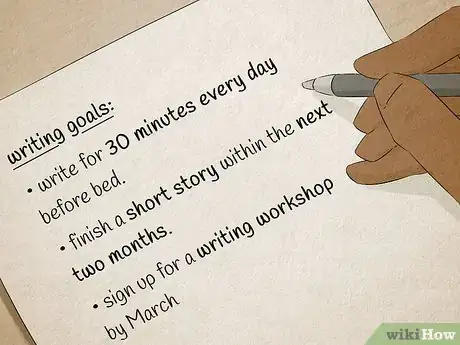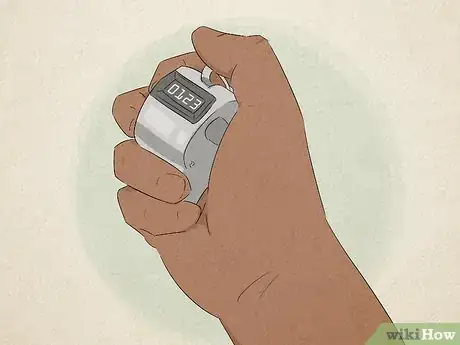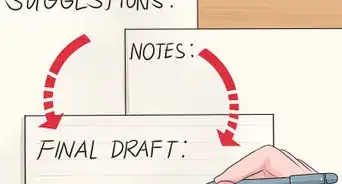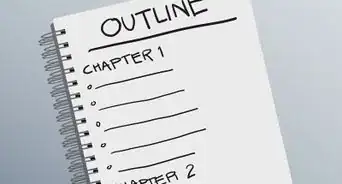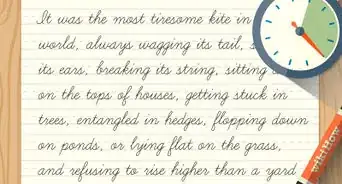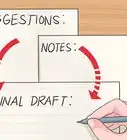This article was co-authored by Lydia Stevens. Lydia Stevens is the author of the Hellfire Series and the Ginger Davenport Escapades. She is a Developmental Editor and Writing Coach through her company "Creative Content Critiquing and Consulting." She also co-hosts a writing podcast on the craft of writing called "The REDink Writers." With over ten years of experience, she specializes in writing fantasy fiction, paranormal fiction, memoirs, and inspirational novels. Lydia holds a BA and MA in Creative Writing and English from Southern New Hampshire University.
This article has been viewed 9,523 times.
A writing style is an author’s personal way of communicating with words. You might think of style as your signature as every author and person has a different one. A style is created with voice, personality, and the mood of the story. Your technique can change depending on the type of writing you're doing, who you're writing for, and your audience. Read on to learn how to find your own unique, special, writing style.
Steps
-
1Be original. In writing, you always want to be original. Don't copy or use the exact words from a different text in your writing. Not only is it not unique and uncreative, but it's also plagiarism. If you like the paragraph or sentence someone else uses in their writing, change it up a bit. Find synonyms and change up the wording. Try to use vocabulary that reflects both who you are and who you are writing for. Moreover, before writing your idea, try to search up if anyone has done it yet to avoid accidentally using someone else's work or ideas.
- If you do take inspiration from, or use someone else's writing piece as a source, credit them by either citing your source or mentioning where you gained your inspiration at the end of your piece in a footnote.
-
2Read. Reading can help you find and enrich your writing style, since you can see examples of other styles this way. Reading other people’s work can also stimulate you to write, since you may feel more inspired. Try to read an array of different types of works.
- To improve your writing style or expand the type of styles you can write in, start reading. It helps you to know other people's writing styles.
Advertisement -
3Write often. This may seem like a simple step, but it is crucial when trying to find and develop your writing style. You don’t have to write one specific story every day, doing that can cause you to become bored and writing may start to feel like a chore. Instead, write about your day, a life experience, fanfiction, or even a wikiHow article. Writing is the easiest and best way to find and improve your writing style.
-
4Use voice. When writing, remember to use Tone and Voice. Voice is the personality you take on in your writing. It is the point of view through which you’re telling a story. Tone is identified by the attitude that a piece of writing conveys. Writers create tone through elements like word choice, sentence structure, and grammar. [1]
-
5Set writing goals. Setting writing goals is very important and easy. A good example of a writing goal is to write at least 500 words per day. Your goal may be more or fewer words, which is okay. Remember to set reasonable goals that you can accomplish. Every writer’s goal is special to them and is part of their writing style.
-
6Set up a schedule. Set reminders for each day, or whatever you decide your schedule to be like. Whether it’s on your phone, or in a planner, make sure you have it set up for a time that you are not busy and can stay focused on writing.
-
7Keep track of how many words you're writing. It’s a good idea to keep track of how many words you write per day or month. There are many ways to do this. If you are using an electronic for writing, the system you are using should say the number of words written. If you are doing it by hand, use a “tally counter” (a small item with a peg in which you click for the number to go up). They are relatively inexpensive, but very accommodating and useful. At the end of the day/month write down how many words you have written in that time and add it to your total word count.
-
8Participate in NaNoWriMo. National Novel Writing Month, or NaNoWriMo, is a writing “contest” between November 1st and November 30th each year. Throughout the month, you write a novel (about 50,000 words). It can help you enhance your writing style a lot. You don’t have to write a whole novel either, it can be a novella (17,500-39,999 words), a novelette (7,500-17,499), or even a short story (7,500 and under).
- You could also participate in other writing events.
- Take writing classes, listen to writing podcasts, attend workshops, or become a member of a writing group or association.
- Have readers, proofreaders, critique partners, or an editor read, revise, edit, or improve your work. Each of them may have something different to say about the work.
-
9Have a writing area. Have a specific place just for writing. It could be your desk, a coffee shop, or even your dining room table. You should have any supplies you need for writing in that area, like, pencils, pens, erasers, notebooks, notepads, electronics, chargers, and anything else you may need. Keep your writing area clean and organized.
-
10Enjoy writing. Possibly the most important and helpful thing when trying to find and develop your writing style is enjoying what you're writing about. If you don't enjoy what you are writing about, you won't want to write, which can affect your writing style. Understand that if writing doesn’t interest you, that’s okay. Writing is not for everyone and is quite hard.
-
11Take breaks. Sometimes, you may just need a vacation from writing. That's perfectly fine! It is crucial to take breaks. If you don't it may stress you out and you may no longer like writing. Taking breaks can also help you find inspiration and will make you feel much better overall. It may be as simple as walking around the block or sitting on a bench at a park.
Community Q&A
-
QuestionWhat is a writing style?
 LilyCommunity AnswerA writing style is a writer’s writing voice. Everyone has a different one.
LilyCommunity AnswerA writing style is a writer’s writing voice. Everyone has a different one. -
QuestionWhy should you keep a tally of your words? Won't that hinder you?
 LilyCommunity AnswerYes, it may hinder you, but it is effective when trying to pass word goals. You do not have to do it, it is merely a suggestion.
LilyCommunity AnswerYes, it may hinder you, but it is effective when trying to pass word goals. You do not have to do it, it is merely a suggestion.




